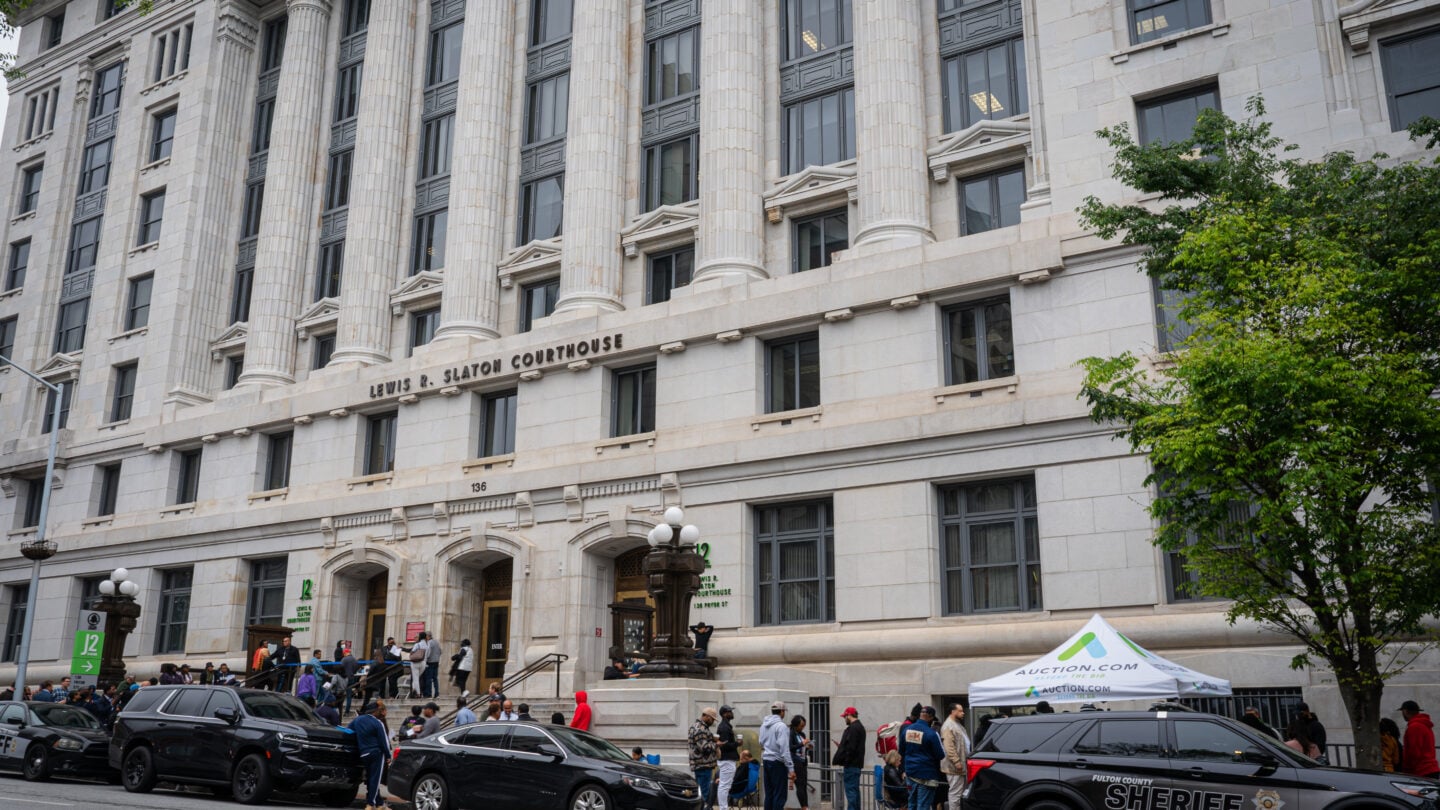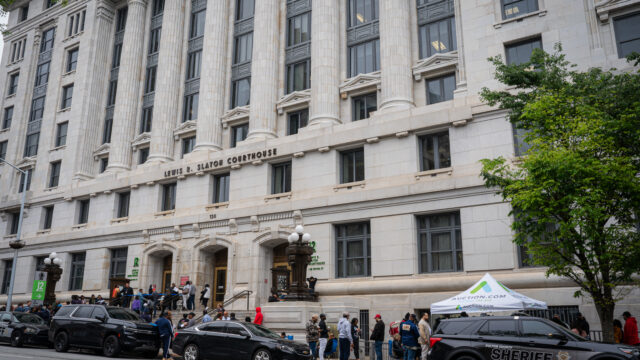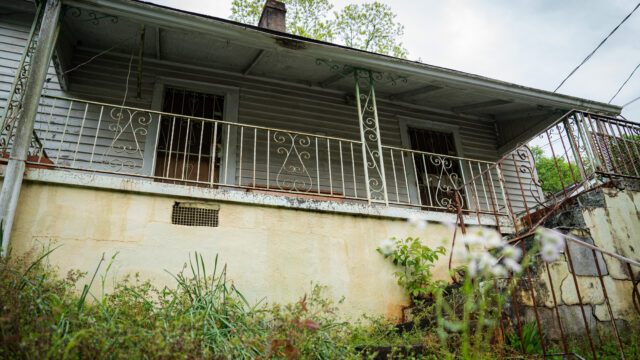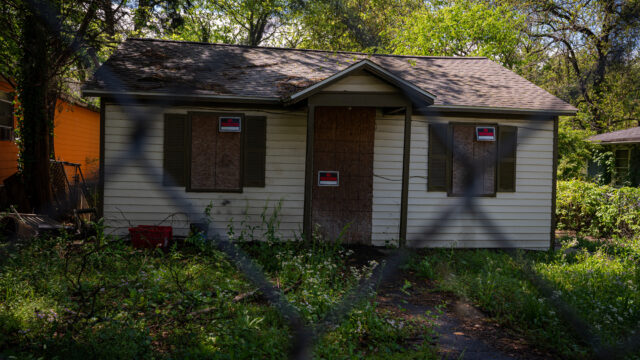Georgia law gives every tax commissioner the choice. When people don’t pay their taxes, the commissioners can collect the debt on their own.
Or they can let investors do it for them.
Of all the counties in Georgia, possibly only one, Fulton County, takes investors up on this offer. The practice can be a quick way to shore up the county budget. But the policy comes at a cost. It puts investors in charge of a process that can end with residents losing their homes.
This Year on WABE: 2023
2023 was a big year at WABE. We turned 75, launched WABE Studios, and the WABE Newsroom continued to cover the critical issues Atlantans care about most. Here are a handful of stories, photos, television and podcasts we think stand out from this year.
A WABE investigation now shows the harmful results for Black homeowners.
The property tax auctions in Fulton County happen monthly, always on the first Tuesday. The day can be exciting for investors. Dozens gather around the county courthouse, standing shoulder to shoulder on the steps and spilling out onto the sidewalk and street.
As the sheriff staff list off the properties behind on taxes, a handful shout out offers. Most only observe and take notes. The tax auction has become known as the place where investors can get a good deal. Videos all over social media promote this.
In one, real estate agent Keisha Thomas, pitching people on her tax sale training, shares what happened when she got her brother to bid. The minimum bid for properties is the amount of taxes owed. Her brother, Darren Gentles, didn’t have to offer much more. For a home in the city of Atlanta, he paid $3,100.
“It’s the real deal,” Gentles said, smiling with his sister, as the two walked away from the courthouse. “No mortgage. Downtown Atlanta.”
But the other side of the tax auction looks different.
“My mom absolutely did not want to leave that house.”
Alicia Thomas
This is the side Alicia Thomas knows. The property the man in this video bought belonged to her mother.
Thomas said her mom inherited the home, actually in a Northwest Atlanta neighborhood called Dixie Hills, with her husband. It had been in his family for at least 60 years.
In the 20 years her mom and stepdad lived in the home, they redid the floors and renovated the kitchen. They built a deck and grew flowers out front.
“They did put a lot of work into it and feel very, very proud of it,” Thomas said.
Her mom thought the home was a blessing.
An Atlanta native, she had rented her whole life. She’s now 70. Thomas said this home was the first she ever owned.
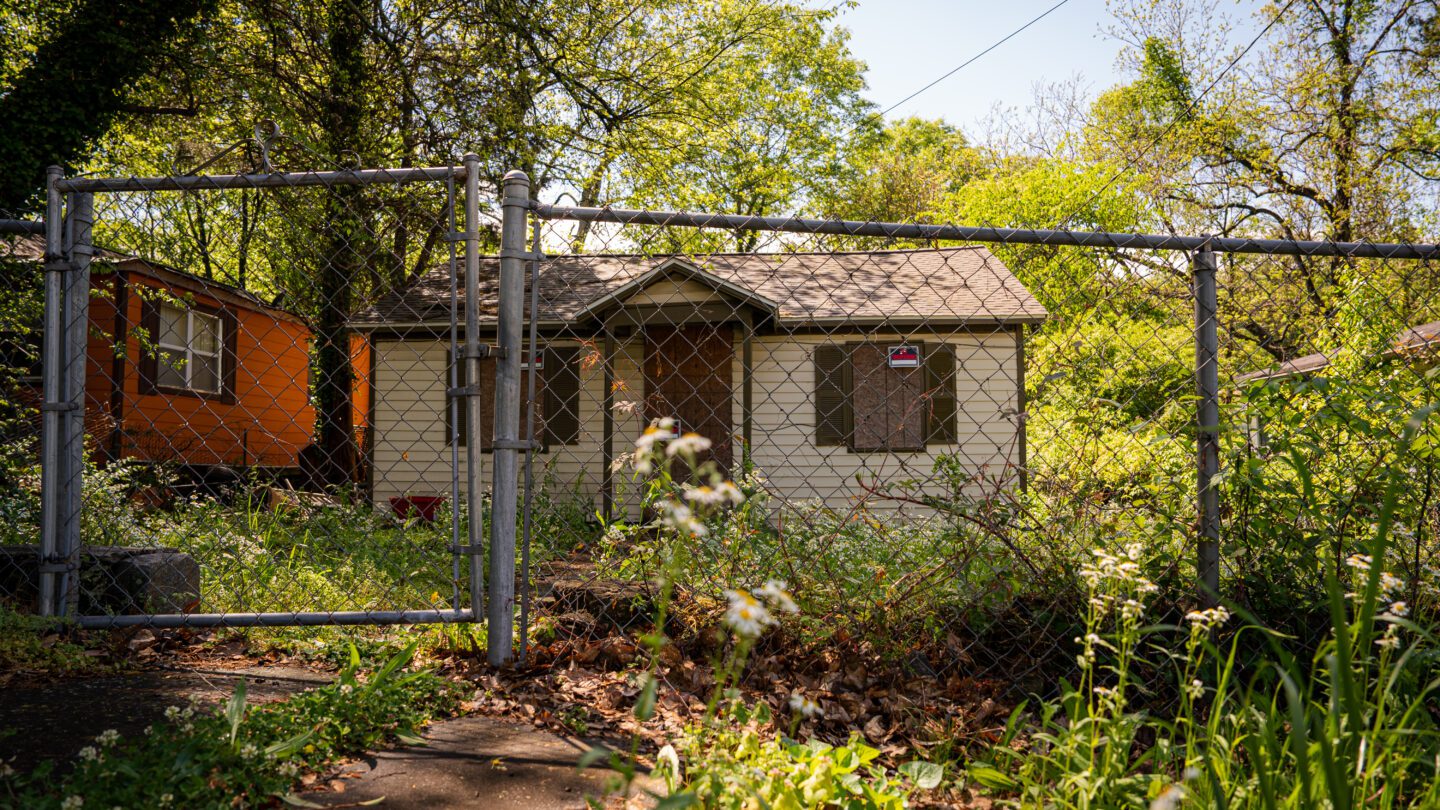
Alicia Thomas’s mom lost her property at Fulton County’s property tax auction in 2016. Years after she was forced to move, it remains vacant. (Matthew Pearson/WABE)
“My mom absolutely did not want to leave that house,” she said.
WABE obtained years of delinquent tax collection data, including all properties auctioned for taxes in Fulton County between 2015 and 2022. That amounted to more than 3,200 parcels.
The analysis showed Black homeowners like Thomas’s mom were almost always on the losing end.
Among the properties considered residential according to county land use codes, 80% were in Census tracts that for decades have been mostly Black.
“It was shocking to see what a disparity it was,” said Atlanta Legal Aid attorney Stacy Reynolds, who’s worked for years to save people’s homes from the tax auction.
“I’ve certainly had enough clients that are in these areas but I assumed there were more in areas that didn’t come to us.”
These tracts only contained around 30% of residential properties in the county.
Fulton’s tradeoff
There are several factors that could contribute to this disparity. These areas, all of which were more than 80% Black at the start of the period analyzed, had lower incomes and older homes.
But Fulton’s practice of outsourcing tax collection to investors also stands out as a factor.
The more than 3,200 properties auctioned for taxes in Fulton County between 2015 and 2022 were concentrated in longtime Black neighborhoods. Analysis by Stephannie Stokes/WABE. Visualization by Lo Benichou.
Frank Alexander, a professor emeritus at Emory University’s School of Law, has also pushed against this system — since the ‘90s.
“Most tax commissioners collect their own taxes and work the digest all the way through to the final events,” he said.
In Fulton though, the county often steps out of the process at the moment taxes become delinquent.
Rather than work to collect the overdue bills, the county takes the record of the debt, known as a tax lien, and sells it to investors.
When the county hands over the liens, that’s a crucial step, Reynolds said. At that point, the county puts the investors in charge.
“Basically they allow these investors to step into their shoes,” she said, “That’s the way it works is they become the tax collector for these taxes.”
The investors get to collect fees and interest from property owners, similar to how the county would.
But if property owners don’t pay, they also can take advantage of another power.
This power, in most counties, is reserved for the tax commissioners. Alexander said because the investors hold the lien, they can choose to auction the property to recover their money.
“Whoever holds the lien is just like a bank that holds a mortgage,” Alexander said. “If it’s not paid, then they can enforce the lien by an auction selling the property to a new owner.”
Typically, investors must wait a year before triggering the auction. The exception is when the taxes owed are older. Then, the investors can move the home to auction within a few months.
“Basically they allow these investors to step into their shoes.”
Atlanta Legal Aid Attorney Stacy Reynolds
This is what makes the tax auctions in Fulton different. Of the thousands of properties auctioned for taxes in the county, most were at the auction because investors put them there.
WABE took a close look at more than 300 of those properties, reviewing court documents and sales records, calling up the former owners and even visiting the parcels in person. Many were vacant lots or rental homes.
But in just that sample, there were also more than 30 stories of residents, like Thomas’s mom, who were displaced from homes their families owned.
The data shows there could be more. For nearly 200 of the auctioned properties, the owners claimed tax breaks, known as homestead exemptions, reserved for owner-occupied homes. For more than 600 auctioned properties, the owner listed the property as their address in tax records, another possible indicator of owners living in their homes.
Thomas’s mom didn’t even know the home was behind.
Her husband had been in charge of property taxes and he had been sick. Thomas said he was struggling with cancer for two years.
“So that was a loss of income,” Thomas said. “She’s trying to sustain the bills and take care of what she could take care of.”
Her husband died in 2016. Then, her mom learned of the property tax payments he’d missed. The county had already transferred the tax liens on her property to an investor.
“It was right after he passed that she started getting these letters and looking at these letters that she owed so much money on the home,” Thomas said.
The total amount was under $3,000, mainly from the solid waste fees that accompany the city tax bill. This isn’t unusual, according to WABE’s analysis. The average property sent to auction in predominantly Black areas owed just under $5,000.
Thomas said for her and her mom, it was more than they could afford. Her husband’s funeral was in January. By August the investor had the sheriff auction her home.
She still could have reclaimed the property. Georgia gives homeowners a year. By that point, though, they have to repay the winning bid plus a 20% premium. Thomas said that wasn’t any more feasible than the original taxes.
She remembers how hard it was for her mom to go.
“Even up until the very day of her moving out, she wasn’t completely packed,” Thomas said. “And I think that was just a part of her refusing to come to the realization that I have to leave this place.”
Lost To Taxes
WABE spoke to several homeowners who lost their properties at the tax auction. We’re featuring their stories throughout this piece.

Stories From The Auctions: Darrell Burford
Darrell Burford doesn’t know the full details of how his family lost their home. He was in his 30s and his career was taking off. He didn’t realize his mom was in financial trouble. The property was a mid-century modern, brick house with a sloped roof off Cascade Road. They lost it for $5,000 in unpaid tax bills at the auction in 2016. The winning bid was $75,000. After assuming ownership, that investor then resold the property for $150,000. It’s now under renovation. The last time Burford was inside was when the Sheriff Marshal came in 2018. “It was definitely an emotional mess,” he said. “Not one of the best days that I’ve had, to say the least.”
The home had been in their family for 40 years. It was where Burford grew up with his grandparents and mom. Burford said he couldn’t even wrap his head around what was inside, including 20 years of Christmas boxes in the basement. He and his mom found a rental in East Point. They stayed there until the COVID-19 outbreak happened and his mom got sick. She was in the hospital for several months and had multiple strokes. His mom, now in a nursing home, has limited ability to speak. While Burford doesn’t have answers for all that happened in those years, he does know how much his mom has lost. “I wish I could have talked to her. I wish I could have helped more, but any son would feel that way,” Burford said.
A system run by ‘speculators’
Fulton County’s Tax Commissioner Arthur Ferdinand declined an interview.
He’s defended this system for the more than 20 years he’s been in office. Media reports have revealed how the tax lien system hampers neighborhood revitalization efforts and leads the county to miss out on potential tax penalties. Articles have also highlighted Ferdinand’s role in the system, from the fees he accepts to collect taxes from local governments, such as Atlanta, to his salary, the highest among officials in the state at the time.
Selling tax liens, he has said, brings revenue to the county. After all, tax liens are just unpaid taxes. And when investors pay for the liens, they pay for the taxes.
This, Ferdinand has said, is how he gets his collection rate so high. For years, it’s been at 99%.
But housing and community advocates have long said this isn’t worth the trade off.
“It’s beyond privatization,” said Dan Immergluck, a professor at Georgia State University and an expert on housing. “It’s turning governance of this whole delinquent property tax system over to speculators.”
While the investors who buy the tax liens may offer payment plans, Immergluck said their main incentive is not to help residents keep their homes. WABE’s findings confirm what their incentives are.
The properties investors chose to auction were in mostly Black areas. But they were also in areas where real estate prices are rising fastest. WABE found three-quarters saw sales prices double over four years between 2015 and 2018.
These were the properties where there was the greatest potential for profit, Immergluck said.
“It’s just incredibly mind blowing that we have a public process that not only allows this to happen, but pushes it to happen,” he said.
He said it hurts the families who’ve been disadvantaged most.
Homeowners in these places, most near the center of Atlanta, endured disinvestment for years. Only recently, with projects like the Atlanta BeltLine, has there been a surge in development.
Immergluck said these tax auctions steal these families’ ability to benefit.
“It’s taking property from folks, who through blood, sweat and tears, earn that property. And then after decades of property values, languishing, see the sudden rise in values,” he said. “And it’s gone.”

Since the start of this system, one investor has bought most of the tax liens in Fulton County, an Atlanta-based company called InVesta. It did not respond to multiple requests emailed through the company’s online form and directly to the longtime president, John Ramsey.
The company oversees tax lien investments on behalf of other investors. According to its website, “InVesta Services and its affiliate companies have worked with some of the largest institutions in the country including Bank Atlantic, JP Morgan Chase and several hedge funds and private equity firms.” InVesta’s related entities also bid on properties at the tax auction.
To a tax law attorney, John Ayoub, the actions of InVesta and other lien investors make sense. He said the investors who buy liens pull out high-value properties for auctions because those are the properties that people will bid on.
That’s how the lien investors get back their money.
“The system is designed for people to make money,” Ayoub said. “Otherwise people wouldn’t do it, and then the taxes wouldn’t be paid.”
That system includes him. He doesn’t get involved with the tax liens. But Ayoub’s law firm helps investors bid on properties once they go to auction.
He said the new people who show up at the auction don’t realize it can be a risky investment. That’s why the bidding prices are so low.
In case homeowners reclaim their properties, investors have to wait a year before they do anything. That’s a year in which they may still have to maintain the grounds of the property and cover its tax bill.
Once the year has passed, the investors then have to pay an attorney to clean the title. Only after that point do they have clear enough ownership of the property to renovate or sell.
Ayoub says the majority of houses at the tax auction are also in very bad shape. He and his staff drive by thousands before the tax sale.
“I’ll be in a neighborhood. Nice house. Nice house. Nice house. Oh, there’s a house with the broken windows and the grass that’s five feet long,” Ayoub said. “That’s the tax sale house.”
They don’t have homeowners looking after them, he said.
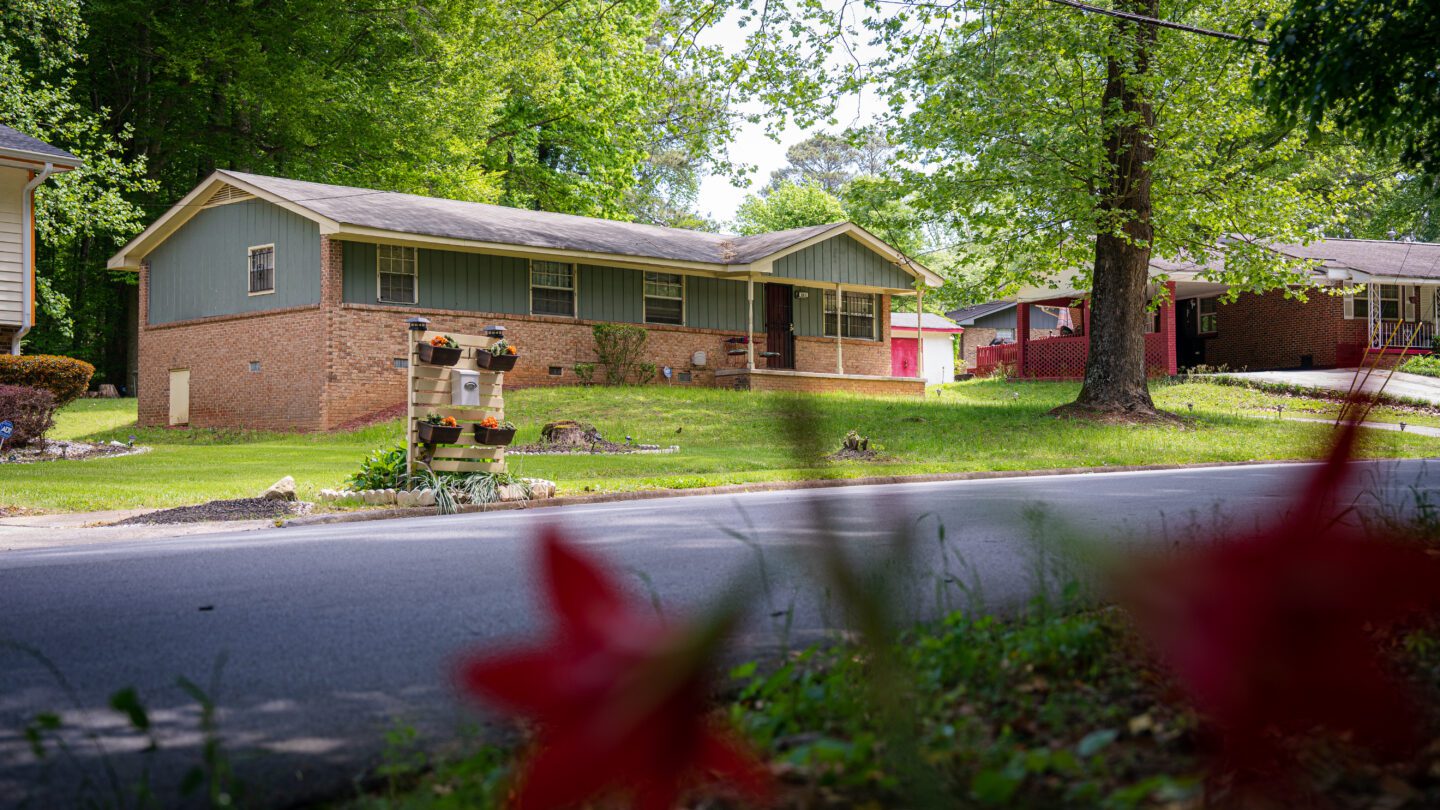
Stories From The Auctions: April Rozier
April Rozier could tell what the home meant to her parents by the effort they invested in it. As a young child, her family lived in apartments, at one point Bankhead Homes. When they finally got their ranch home outside the perimeter at the southwestern edge of Atlanta, her dad, a truck driver for a brick company, built a patio and grill outside. Her mom, a caterer, added an extra kitchen. Decades later, when Rozier’s parents died, she didn’t plan to move to the house. She had an apartment. But she thought she might pass the home onto her own daughter. “It was my family’s home, it was something my mother and my father worked hard for. And the thing was, at least I could try to keep it up for their memory.”
Rozier tried to do that. She took care of the yard and paid the property tax bill. She made some updates to the home inside. But she ran into issues transferring the title of the home from her parents’ name. Her mom left a will that the executor didn’t probate, and her dad left no will at all. Time passed as Rozier tried to sort the ownership out. Then, the county changed the tax bill. Her parents had a homestead exemption, which reduces property taxes for people who live in the home. The county removed that exemption, not just for one year but for multiple years. Rozier said the bill went from hundreds to thousands. “They wanted it all upfront,” she said. “I didn’t have it all up front.”
Unable to pay, Rozier gave up on maintaining the home. Her brother moved into the place for a while. But after a while, an investor bought the tax debt on the home and put it up for sale at the tax auction in 2015. Afterward, the new owner who won the property from the auction evicted her brother. He lived in an extended stay for some time before he died. As for Rozier, she’s still hurt. She never wants to live in the county where she grew up again. “I’d rather go to any other county before Fulton County because I have been very soured on Fulton County.”
In the occasional cases where there are owners in the property, he said it is sad. He’s seen that. Someone loses their job or they have a disability.
But in his mind, there will always be that side to tax collection — no matter who is in charge, the county or an investor. Ayoub has worked in this field for 20 years ever since he was a Fulton County attorney representing the tax commissioner.
“If you enforce the tax sales properly, they’re going to be people who lose their homes,” he said. “If you don’t enforce the tax sales properly, your children are going to really crummy schools with flooded basements and rats running around.”
He said local governments need property taxes to fund their services.
Publicly available reports show other counties do manage to collect their taxes without doing what Fulton does, however. Gwinnett and Cobb Counties regularly reach 99% collection rates. Dekalb County’s rate ranges from 95% to 97%.
None of these counties sell tax liens to investors to retrieve their delinquent taxes. When asked why not, only Gwinnett County’s tax commissioner responded.
“It neither benefits the citizens of Gwinnett County nor the Gwinnett County Tax Commissioner’s Office,” the spokesperson said.
When these counties auction delinquent properties, the local tax commissioner oversees the process. Of the three counties, DeKalb auctioned the most properties between 2015 and 2022. At 850 parcels, the number was less than a third of the properties auctioned for taxes in Fulton.
The auctioned parcels were also far less concentrated in Black neighborhoods. In DeKalb County, just 55% of residential properties auctioned were in areas that were mostly Black. These areas held 40% of the county’s residential properties.
“The rest of the counties in Georgia say our job is to actually serve the people who might be losing their homes rather than simply collect their taxes.”
Emory Law Professor Emeritus Frank Alexander
DeKalb County’s tax commissioner didn’t comment on these findings. Alexander, the law professor and a national expert on tax enforcement, acknowledged there could be several reasons the auctions in DeKalb have a smaller effect on mostly Black areas.
But he wouldn’t downplay the role tax commissioners can play in resolving homeowners’ debt without the tax auctions.
The tax commissioner’s role
“The difference,” he said, “is that other counties, the entire rest of the state of Georgia, the tax commissioners see that their job is to collect the taxes, but to do so in a manner that promotes the common good.”
Alexander said this is what it comes back to. Most tax commissioners, including Arthur Ferdinand, are elected officials. If Ferdinand believes his job is to collect bills, Fulton’s system does that.
But he said other tax commissioners see a broader responsibility — to reach out to homeowners to see what their situations are, to offer payment plans and to help them keep their homes.
“The rest of the counties in Georgia say our job is to actually serve the people who might be losing their homes rather than simply collect their taxes,” he said.
Fulton’s tax commissioner does have a policy to not sell tax liens on homes with seniors. To qualify, though, they have to claim a senior homestead exemption.
Not all seniors do. Thomas’s mom wasn’t quite old enough at the time her property sold.
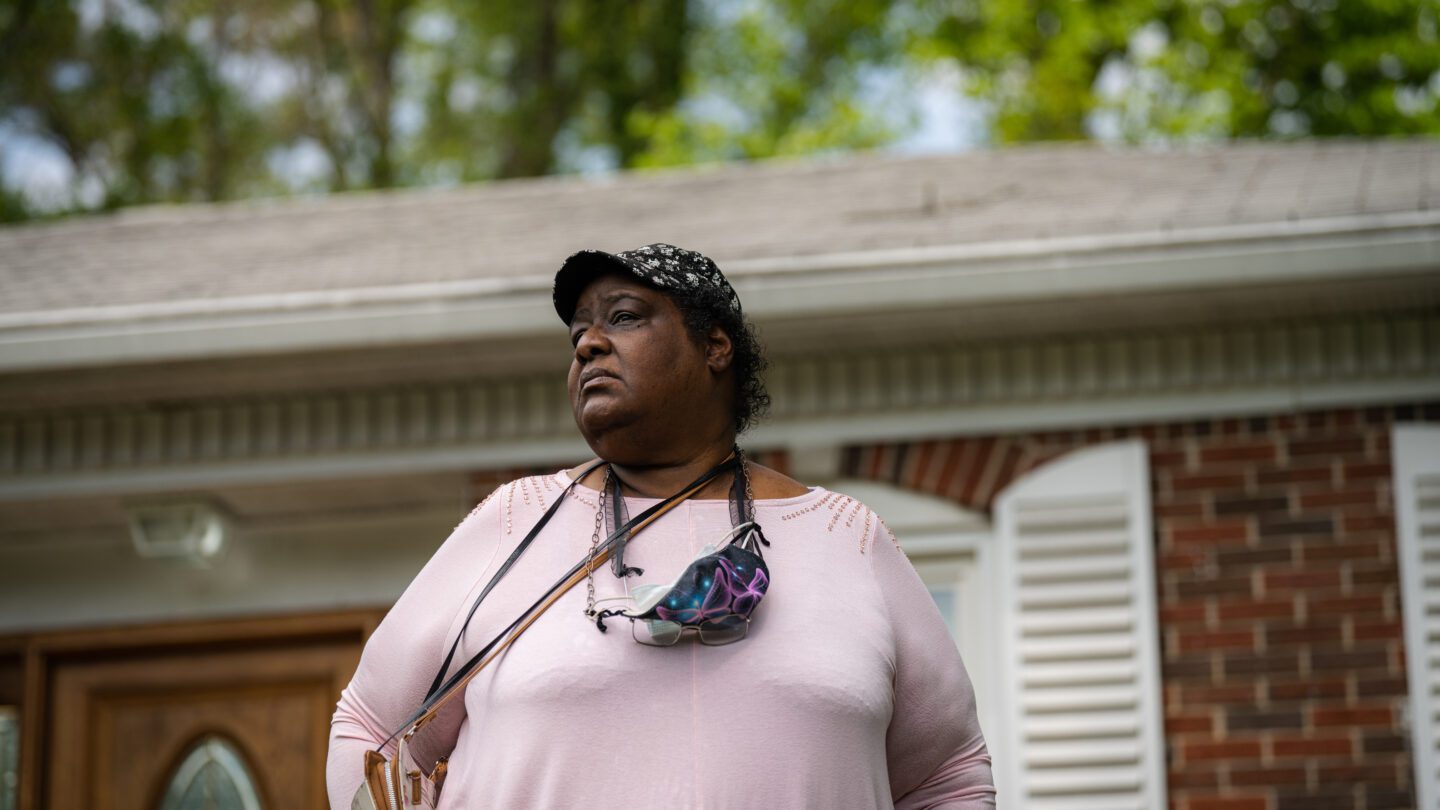
Stories From The Auctions: Adrianne Merideth
The house in South Atlanta had been in Adrianne Merideth’s family for nearly a hundred years. It originally belonged to her aunt and uncle. Before Merideth moved there, she lived a neighborhood away in Pittsburgh with her mom. That was where she grew up as her mom took care of homes across town in Druid Hills. When she was an adult, the two moved into the South Atlanta house to care for her aunt and uncle. Eventually it’s where Merideth cared for her mom too. After all three of them passed, Merideth stayed in the home alone. Always preferring to stay inside to read and write, she appreciated that the house and its street were quiet.
After her mom died, she struggled to maintain the home. During a medical procedure, she developed a disability, severe back pain that made it difficult to stand or walk. She could no longer work, but the state denied her application for disability. This meant Merideth had no income. The old shotgun home fell into disrepair. She remembers how the ceiling leaked when it rained. Ultimately, though, it was the taxes that sealed the property’s fate. Merideth had missed years of the solid waste fees that accompany the city taxes. Finally, in 2021, the home went for sale at the tax auction. “I got notices, but if you have no money what can you do,” Merideth said.
Merideth now lives in a rooming house in DeKalb County, the farthest she’s ever been from her childhood neighborhood. She’s getting help with her rent from a staff member at a nonprofit for now. She finally qualified for disability. Now she’s hoping she can afford another place of her own. She has always written poetry. Before her eviction from South Atlanta, she wrote the poem “Finality”: “My final recourse is now Gone / Whatever could be tried is Done / With every coming of the Dawn / Hope melts like dew in the Sun / Each avenue has been Withdrawn / Until I am left with None.”
For families like hers, Reynolds, the legal aid attorney, says the consequences can be far-reaching. The tax auctions disrupt where they live but also their ability to build wealth.
“Generational wealth is such an important thing,” she said. “The home is what most people have as their wealth to be able to pass on to their families, and losing it to property taxes ends that.”
The families only get whatever’s leftover from the auction, what’s called excess funds. This is the winning bid minus the taxes owed.
The fact that homeowners receive anything does make Georgia more favorable to homeowners than other states. A case before the U.S. Supreme Court centers on a practice in Minnesota where the government keeps even the surplus proceeds from the tax sale.
Even so, Reynolds said the excess funds are usually a fraction of the home’s fair market value. Thomas’s mom’s house sold for so little, there was nothing left.
WABE reached out to the investor who bought her home, both through his attorney and through his sister. He never responded. Years later, the home remains vacant.
Thomas said her mom sees it on their drives through the neighborhood. She’s now staying with family members outside the city. But Thomas said she’s still dealing with that loss.
The home represented her community for 20 years. She was friends with her neighbors. Her church was on the same street.
Thomas swipes through her phone to photos from the time when her mom still had the home. In each one, as her mom poses in the living room or with family, she has a bright, big smile.
Thomas said she doesn’t see those smiles much anymore.
“She was a very, very happy person when she was in her own home,” she said.
This investigation is supported by the Data-Driven Reporting Project.
